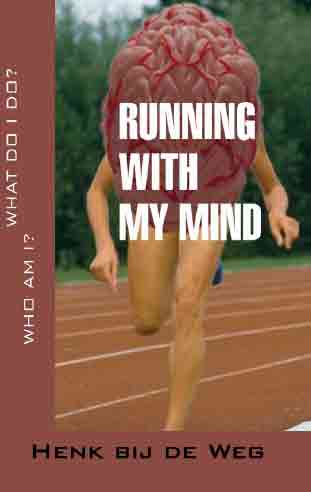| terug
(Nederlands) back (English) Henk bij de Weg Running with my mind. Who am I? What do I do? PublishAmerica, Baltimore, MD (USA), 2013; 154 blz. The book is no longer available from the publishing house but can still be ordered by sending an e-mail to the author: henk@bijdeweg.nl . Price € 15.00 euros plus post and package. |
 |
Summary
The mind is a strange instrument. You can’t only think with it. You can also run with it. Or rather, you can train your muscles with it. The book contains about ninety mini-essays about about what you can do with your mind and what your mind does with you; how the mind makes who you are and what you do; and also how other factors determine you and the way you act. It addresses a variety of themes such as the influence of the unconscious, free will, your identity, and responsibility.
The book is divided in five sections. A first section contains mini-essays on unconsciousness. The central question is how unconscious factors steer our actions. For do we really have a free will? Also this question is treated here but even more so in the second section.
The last secion is a bit different from the four foregoing sections in the sense that it has no central theme. However, the mini-essays here can be summarized by the idea of "what is moving us". They discuss the factors that determine us in the broadest sense. For instance, we think that we deal with technical problems while in fact we have to do with social problems. We want to construct an ideal society but we make a mash of it.We think that we are guided by the good or the bad in us, but we are pushed into a certain direction. These are some of the themes discussed in this section.
This summary gives only a limited view of what is treated in the mini-essays. They discuss a variety of subjects. This summary is actually an incentive for the reader to discover the book and then, as the introduction says it, to make him or her think.
The book has a list of references and it is illustrated with photos by the author.
Contents
Making the reader think
Body, Brain and Mind
The Internet and our brain
Tagging my mind
The smile on my face
What it is like to be a zombie?
What it is like to be a zombie?
Me ad my zombie
Who steers the body?
Am I responsible for my actions or is my zombie? (1)
Running and my body
Body scheme
Body knowledge and propositional knowledge
Words and knowledge
Running with my mind
Superstitious like a pigeon
The fluency of reality
Hallucinating reality
Human maps
Dangerous ideas
Being guilty of what one hasn’t done
Free will
Freedom of the will
Freedom to act
Freedom and determination (1)
Freedom and determination (2)
Do my hormones make my choices?
What are we voting for?
What are we voting for?
Person and
Identity
(23) Am I different persons?
(24) Do my eyes see or does my person?
(25) Our future piggish identity
(26) Personal identity and those who are watching you
(27) Personal identity and Big Brother who is watching you
(28) Big Brother and Bentham’s Panopticon
(29) The contextuality of personal identity
(30) Culture and the person I am
(31) The group a person belongs to
Ethics and Action
Feeling guilt for what one hasn’t done
Doing and allowing
Allowing and responsibility
Praising the one who deserves it
Being responsible depends on what one does
Objective and subjective responsibility
Responsibility and the levels of meaning
Bad actions, good effects
Responsibility and how we describe what we do (1)
Responsibility and how we describe what we do (2)
The measurability of responsibility
What does being responsible mean?
No responsibility for what one did?
Good and bad actions (1)
Good and bad actions (2)
Good and bad actions (3)
‘Bij accident’ and ‘by mistake’
Being praised for what one does
The relativity of action
The development of man and the capacity to act
Destructing actions
Producing and practicing
How long does an action last?
Trust
What Is Moving Us?
Social problems cannot be solved as if they were technical problems
Man-made future
Our technical limits are human
Responsibility for what happens
Arcadia
The devil in your mind
The hero in your mind
‘If you start a man killing, you cannot turn him off like a machine’
The banality of banality
Liberty of conscience
Body and soul in the garden
How to enjoy my bike rides
Running as an art and as a way of life
Time as distance
A passport to the world
Can one desire without suffering?
‘Only those who can see can also dream’
Some thoughts about a quotation from Martha Nussbaum
What is wrong with science?
The bucket of the mind
On philosophical puzzles
References